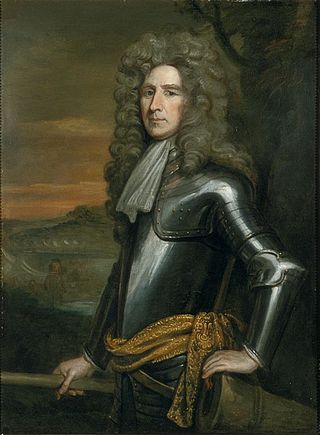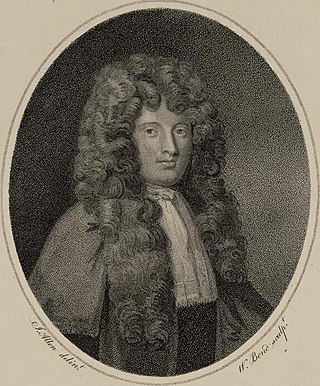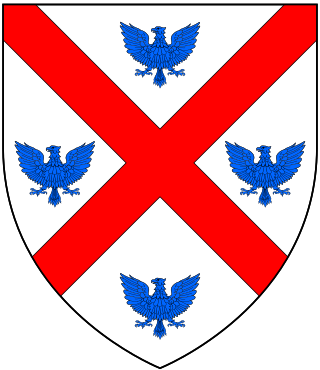The Whigs were a political party in the Parliaments of England, Scotland, Ireland, Great Britain and the United Kingdom. Between the 1680s and the 1850s, the Whigs contested power with their rivals, the Tories. The Whigs became the Liberal Party when the faction merged with the Peelites and Radicals in the 1850s. Many Whigs left the Liberal Party in 1886 over the issue of Irish Home Rule to form the Liberal Unionist Party, which merged into the Conservative Party in 1912.

Charles II was King of Scotland from 1649 until 1651 and King of England, Scotland, and Ireland from the 1660 Restoration of the monarchy until his death in 1685.
William Sacheverell was an English politician who sat in the House of Commons in two periods between 1670 and 1691.

Anthony Ashley Cooper, 1st Earl of Shaftesbury PC, FRS, was an English statesman and peer. He held senior political office under both the Commonwealth of England and Charles II, serving as Chancellor of the Exchequer from 1661 to 1672 and Lord Chancellor from 1672 to 1673. During the Exclusion Crisis, Shaftesbury headed the movement to bar the Catholic heir, James II, from the royal succession, which is often seen as the origin of the Whig party. He was also a patron of the political philosopher John Locke, with whom Shaftesbury collaborated with in writing the Fundamental Constitutions of Carolina in 1669.

John Somers, 1st Baron Somers, was an English jurist, Whig statesman and peer. Somers first came to national attention in the trial of the Seven Bishops where he was on their defence counsel. He published tracts on political topics such as the succession to the crown, where he elaborated his Whig principles in support of the Exclusionists. He played a leading part in shaping the Revolution settlement. He was Lord High Chancellor of England under King William III and was a chief architect of the union between England and Scotland achieved in 1707 and the Protestant succession achieved in 1714. He was a leading Whig during the twenty-five years after 1688; with four colleagues he formed the Whig Junto.
The Tories were a loosely organised political faction and later a political party, in the Parliaments of England, Scotland, Ireland, Great Britain and the United Kingdom. They first emerged during the 1679 Exclusion Crisis, when they opposed Whig efforts to exclude James, Duke of York from the succession on the grounds of his Catholicism. Despite their fervent opposition to state-sponsored Catholicism, Tories opposed his exclusion because of their belief that inheritance based on birth was the foundation of a stable society.

The Exclusion Crisis ran from 1679 until 1681 in the reign of King Charles II of England, Scotland and Ireland. Three Exclusion Bills sought to exclude the King's brother and heir presumptive, James, Duke of York, from the thrones of England, Scotland and Ireland because he was a Roman Catholic. None became law. Two new parties formed. The Tories were opposed to this exclusion, while the "Country Party", who were soon to be called the Whigs, supported it. While the matter of James's exclusion was not decided in Parliament during Charles's reign, it would come to a head only three years after James took the throne, when he was deposed in the Glorious Revolution of 1688. Finally, the Act of Settlement 1701 decided definitively that Roman Catholics were to be excluded from the English, Scottish, and Irish thrones, later the British throne.

Henry Sydney, 1st Earl of Romney was an English Army officer, Whig politician and peer who served as Master-General of the Ordnance from 1693 to 1702. He is best known as one of the Immortal Seven, a group of seven Englishmen who drafted an invitation to William of Orange, which led to the November 1688 Glorious Revolution and subsequent deposition of James II of England.

Whiggism or Whiggery is a political philosophy that grew out of the Parliamentarian faction in the Wars of the Three Kingdoms (1639–1653) and was concretely formulated by Lord Shaftesbury during the Stuart Restoration. The Whigs advocated the supremacy of Parliament, government centralization, and coercive Anglicisation through the educational system. They also staunchly opposed granting freedom of religion, civil rights, or voting rights to anyone who worshipped outside of the Established Churches of the realm. Eventually, the Whigs grudgingly conceded strictly limited religious toleration for Protestant dissenters, while continuing the religious persecution and disenfranchisement of Roman Catholics and Scottish Episcopalians. They were particularly determined to prevent the ascension of a Catholic heir presumptive to the British throne, especially of James II or his legitimate male descendants and instead granted the throne to the Protestant House of Hanover in 1714. Whig ideology is associated with early conservative liberalism.

Sir William Williams, 1st Baronet was a Welsh lawyer and politician. He served as a Member of Parliament for Chester and later Beaumaris, and was appointed Speaker for two English Parliaments during the reign of Charles II. He later served as Solicitor General during the reign of James II. Williams had a bitter personal and professional rivalry with Judge Jeffreys.

Richard Hampden was an English Whig politician and son of Ship money tax protester John Hampden. He was sworn a Privy Counsellor in 1689 and was Chancellor of the Exchequer from 18 March 1690 until 10 May 1694.
Henry Bertie, JP, of Chesterton, Oxfordshire was an English soldier and Tory politician who sat in the English and British House of Commons between 1678 and 1715.
Henry Powle was an English lawyer and politician who sat in the House of Commons at various times between 1660 and 1690, and was Speaker of the House of Commons from January 1689 to February 1690. He was also Master of the Rolls.

Sir George Treby JP (1643–1700), of Plympton, Devon, and of Fleet Street in the City of London, was Lord Chief Justice of the Common Pleas and six times Member of Parliament for the Rotten Borough of Plympton Erle, Devon, largely controlled by him and his descendants until abolished by the Great Reform Act 1832.

The Habeas Corpus Parliament, also known as the First Exclusion Parliament, was a short-lived English Parliament which assembled on 6 March 1679 during the reign of Charles II of England, the third parliament of the King's reign. It is named after the Habeas Corpus Act, which it enacted in May 1679.
Robert Geoffrey Neill was an English writer of historical fiction, best known for his debut novel, Mist over Pendle, published in 1951, which has remained in print since first appearing. The novel presents a fictional account of the events leading up to the famous Pendle witches trial in 1612.

The English Convention was an assembly of the Parliament of England which met between 22 January and 12 February 1689 and transferred the crowns of England and Ireland from James II to William III and Mary II.

The Loyal Parliament was the only Parliament of England of King James II, in theory continuing from May 1685 to July 1687, but in practice sitting during 1685 only. It gained its name because at the outset most of its members were loyal to the new king. The Whigs, who had previously resisted James's inheriting the throne, were outnumbered both in the Commons and in the Lords.

The Exclusion Bill Parliament was a Parliament of England during the reign of Charles II of England, named after the long saga of the Exclusion Bill. Summoned on 24 July 1679, but prorogued by the king so that it did not assemble until 21 October 1680, it was dissolved three months later on 18 January 1680/81.
John Darcy, Lord Conyers was an English soldier and one of the two members of the House of Commons of England representing Richmond, Yorkshire, briefly in 1681 and again from 1685 to 1687.










